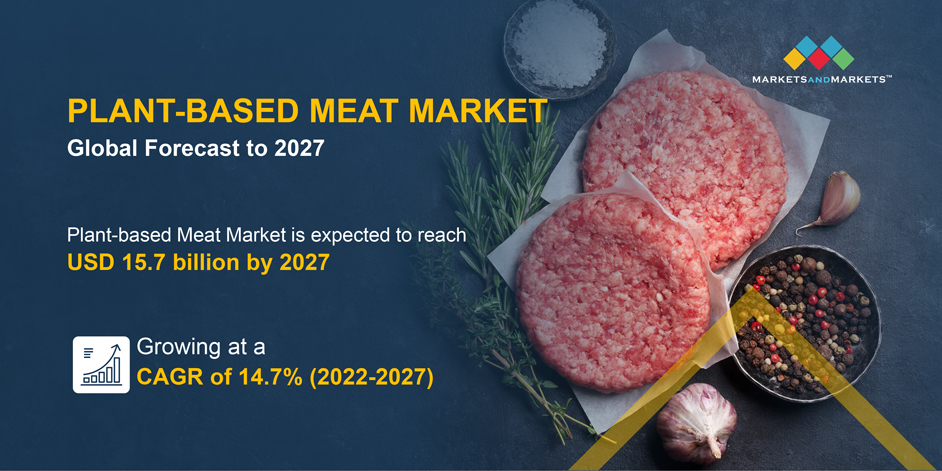The global plant-based meat market is experiencing unprecedented growth as consumer preferences shift toward sustainable, ethical, and health-conscious food choices. With rising concerns about the environmental impact of animal agriculture, health benefits associated with plant-based diets, and technological advancements in food processing, the industry is poised for significant expansion. This blog explores the key drivers, trends, challenges, and future outlook of the plant-based meat market.
Plant-based Meat Market Overview
Plant-based meat is designed to mimic the taste, texture, and nutritional profile of conventional meat while being entirely derived from plant sources such as soy, pea protein, wheat gluten, and mushrooms. According to market research, the plant-based meat industry is projected to grow at a CAGR of over 14.7% in the coming years, reaching billions in market value by 2027.

Plant-based Meat Market Drivers
- Health Consciousness: Consumers are increasingly adopting plant-based diets to reduce the risk of chronic diseases like heart disease, obesity, and diabetes.
- Environmental Concerns: The carbon footprint of plant-based meat is significantly lower than conventional meat, making it an eco-friendly alternative.
- Ethical Considerations: Concerns over animal welfare and factory farming have led many consumers to seek cruelty-free alternatives.
- Technological Advancements: Companies are investing heavily in research and development to enhance the taste, texture, and nutritional value of plant-based meat.
- Expanding Retail and Foodservice Presence: Major food chains and retailers are adding plant-based options to their menus and shelves, making these products more accessible to consumers.
Plant-based Meat Market Trends
- Innovation in Ingredients: The development of alternative protein sources such as mycoprotein, lentils, and chickpeas is expanding the range of plant-based meat options.
- Hybrid Meat Products: Some companies are blending plant proteins with traditional meat to create hybrid products, appealing to flexitarian consumers.
- Clean Label Movement: Consumers are demanding shorter ingredient lists with natural, minimally processed components.
- Regional Expansion: While North America and Europe dominate the market, the Asia-Pacific region is emerging as a high-growth area due to increasing vegetarianism and flexitarian trends.
Challenges in the Industry
Despite rapid growth, the plant-based meat market faces several challenges:
- Price Parity: Plant-based meat alternatives are often more expensive than conventional meat, which may deter price-sensitive consumers.
- Taste and Texture Enhancement: While advancements are being made, some consumers still find plant-based meat lacking in taste or texture compared to traditional meat.
- Supply Chain Constraints: Scaling up production to meet demand while maintaining quality remains a challenge for manufacturers.
Book a meeting with our experts to discuss your business needs:
https://www.marketsandmarkets.com/speaktoanalystNew.asp?id=44922705
Future Outlook
The future of the plant-based meat market looks promising, driven by continuous innovation and growing consumer awareness. As production scales up and costs decrease, plant-based meat is expected to become more affordable and mainstream. Moreover, collaborations between food tech companies, retailers, and restaurants will further accelerate market penetration.


